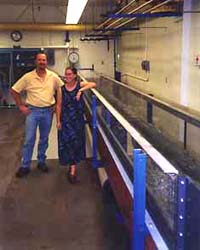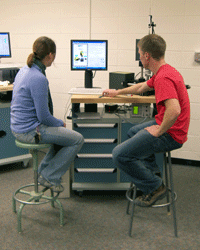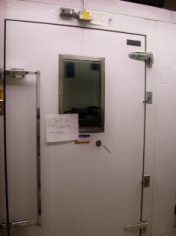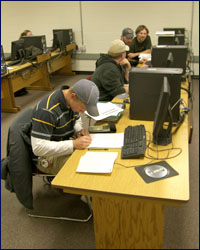Instructional and Research Laboratories
Construction Management Laboratory
This lab serves the needs of both CE and CET students needing flat top table space to prepare drawings, accomplish quantity take-off, and perform other basic tasks requiring layout space and multiple references. Laboratory exercises are integrated with the lecture material.
Bulk Materials Laboratory
The bulk materials lab supports efforts within the CE materials curriculum. This laboratory has mixing facilities and bulk materials for concrete. Materials are stocked in the laboratory and used most frequently for the concrete beam fabrication completed in the Structures II course.
Environmental Laboratory
While primarily used for graduate instruction and research, the purpose of this lab is to acquaint students with the details of water and wastewater analysis, and to provide hands-on experience in the operation and performance of traditional and innovative systems for water and wastewater treatment. Research activities in this lab have also relied heavily on undergraduate student involvement, ranging in scope from relatively routine analytical procedures, such as nitrogen and COD analyses, to the design, construction, and testing of an innovative biological treatment system for remediation of chlorinated hydrocarbons in groundwater. For the past several years, equipment that is lacking in the environmental engineering lab has been graciously shared by the Center for Biofilm Engineering (CBE) with the CE Department, an arrangement that is expected to continue for some time.
Fluid Mechanics Laboratory

This is a hands-on laboratory for students in CE and CET, wherein the theory presented in lecture is reinforced by the lab experience. Students become familiar with common flow measuring devices including venturi, orifice, and weir types. Evaluations are made on flows of compressible (air) and incompressible (water) fluids. Performance curves of pumps are developed. Applications that demonstrate the fundamental equations of energy, momentum, and continuity are carried out. This lab involves comprehensive technical report writing in which students gain exposure to report writing, organizing experimental results, graphical presentation of data, and statistical analysis of data.
Geotechnical Materials and Asphalt Laboratory
This laboratory is used for both required junior level courses and senior level technical electives, and in both the CE and CET curriculums. The CE students perform basic soil mechanics experiments to help illustrate the concepts covered in the required junior level introductory course. These experiments provide soil parameters necessary for both engineering analysis and design work and for routine material testing and field inspection work. The majority of experiments are conducted by students. Only the more complex experiments involving expensive electronic instrumentation are performed as demonstration experiments. The laboratory is used by senior level students taking a technical elective that allows them to perform more difficult and time consuming experiments not covered in the introductory course.
This laboratory also services the needs of CET 303, Highway Technology, and CE 451, Highway Pavements. It also serves the research interests of the department. Students learn how to compact asphalt concrete using the Marshall and Superpave procedures and test for mix properties, such as stability, flow, unit weight, air voids, and Rice specific gravity. These tests are essential for students who intend to pursue employment with the Montana Department of Transportation or with asphalt contractors and suppliers. Students are expected to submit written reports related to the experiments.
Materials Testing Laboratory

This laboratory, containing materials testing machines, is used to introduce students to material properties through actual testing of specimens. The department uses this lab in support of several courses where this type of experimentation is used, such as rebar tests performed within the concrete class.
Photogrammetry Laboratory
This facility allows students to carry out exercises in some of the basic photogrammetry operations, such as object height determination from single contact prints, as wells as stereopairs, photographic scale and distance measurements, photographic coordinate measurement, and mapping. The lab experience gives the students greater realization about the principles discussed in the lecture. This lab is in support of elective courses available to engineering and technology students. The photogrammetry course also applies to the core courses that students must take in order to be eligible for the testing associated with state licensing as a registered land surveyor.
Senior Project Resource Room
This room services the needs of CE and CET junior and senior teams working on assigned design and construction management projects. Lockers are required for secure storage of team materials to include reference materials and team project solution products, i.e., plans, schedules, estimates, and narrative reports. This workroom provides a realistic work environment for both CE and CET students to perform together in a team environment.
Structures Laboratory
The structures laboratory supports the hands-on experimental programs of concrete beam and column fabrication and testing. The facility includes set ups for testing of structural panels, frames, and associated dynamics testing using MTS hydraulic test equipment. It includes data acquisition equipment for measuring force, displacement, and strains, coupled with D/A conversion for direct readout on a personal computer. Demonstrations are also used in support of courses dealing with frame structures, plates, and shells both under static and dynamic loads.
SubZero Research Facility

This unique state-of-the-art research facility will foster synergy among the myriad of scientific disciplines. The scientific and educational interaction that this facility offers will enhance MSU’s position as a premier research center focusing on the cold natural environment and identify it as a national and international center for subzero research. Funding for a low temperature research facility has been appropriated through the National Science Foundation – Major Research Instrumentation program, the Murdock Charitable Trust and Montana State University.
Surveying Laboratory
This lab services the needs of the CE and CET programs in basic plane surveying, and supports the advanced surveying courses as well. The equipment is used in applications that give practical training and provide insight about the topics covered in lecture. At the basic level topics include differential leveling, three-wire leveling, traversing, topographic mapping, slope staking, and construction stake-out. Advanced topics include astronomical observations and precision surveys utilizing an electronic field book.
Tait Computer Laboratory

This computer lab serves the students in the Civil Engineering department. The lab contains 32 computers networked to a Windows NT server. Additionally, the room is equipped with hardware that connects all computer monitors to a master computer that can be used for demonstration. The lab is used for instruction by faculty in various departmental courses. General purpose and engineering software is installed in the lab. Also, specialized software for Civil Engineering applications has been installed. When instruction is not taking place, the lab is available for students as a general computing resource.
Transportation and ITS Laboratory
The Transportation & ITS lab is used to support instruction and research in the various transportation engineering areas. The lab is equipped with state-of-the-art workstations and many software packages for traffic simulation, signal optimization, capacity analysis and transportation planning (besides the more conventional general application and analytical software packages). The lab includes a conference table with multimedia equipment, which makes it ideal as a classroom for graduate courses and small group presentations.
The Transportation & ITS lab is equipped with most of the data collection equipment that are needed in performing traffic studies. The lab has an advanced traffic monitoring system, which allows online monitoring and investigation of study sites using surveillance cameras, mobile trailers, and a wireless communication system. Further, the lab has a complete set up for conducting hardware-in-the-loop signal timing simulation.
